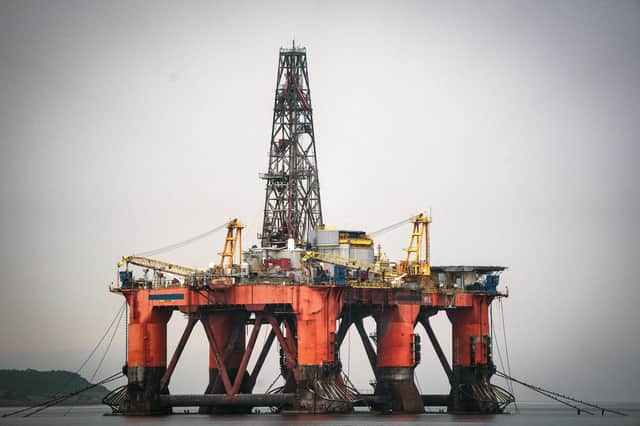Declining oil and gas industry having a 'disproportionate' impact on the north of Scotland


The decline in the oil and gas industry is having a greater impact on wages and employment levels in the north of Scotland compared to elsewhere, according to a new report.
The Institute for Fiscal Studies (IFS) has found employment and earnings in Scotland have seen a slower growth than elsewhere in the UK since 2014, despite growing substantially faster during the 2000s.
Advertisement
Hide AdAdvertisement
Hide AdThe institute suggests this is driven by deteriorating employment and wage earnings in the Highlands, islands and the north-east, caused by the declining oil and gas industry.
Employment rates in the Highlands, islands and north-east fell by three percentage points between 2013 and 2015, and again between 2020 and 2022.
In contrast, employment in the rest of Scotland increased by two percentage points in the south, and three percentage points in the east and west, broadly in keeping with trends in the rest of the UK.
At the same time average monthly earnings in the north-east fell from 30 per cent above the rest of the UK average (excluding London) to 14 per cent above, while those in the Highlands and islands fell from six per cent below to 10 per cent below.
In contrast the mean monthly earnings in the east, south, west and central Scotland grew at almost the same rate as the rest of the UK.
David Phillips, associate director at the IFS and one of the report’s authors, said: “The complex regional patterns and trends in employment and earnings pose something of a policy conundrum for the Scottish Government, especially given the limited funding it has available.
“On the one hand, it is likely to face political pressure to provide additional support to the north of Scotland to help make up for reductions in employment and earnings associated with the decline in the oil and gas industry.
“Moreover, it will want to keep the often highly skilled and highly paid workers from these sectors in Scotland, not least given the outsized contribution their earnings make to supporting local economies and devolved tax revenue.
Advertisement
Hide AdAdvertisement
Hide Ad“On the other hand, it remains the case that the areas with the lowest earnings and employment are concentrated in central and south-western Scotland, despite improvements in performance in some of the more deprived areas around Glasgow in recent years.”
Mr Phillips added that while there needs to be more support in the “traditionally struggling areas” of Scotland, targeted interventions are needed to help workers in the oil and gas industry take up jobs in renewables and green energy instead.
Former finance secretary Kate Forbes said the just transition can only work if it protects earnings and employment levels in the north of Scotland.
The MSP for Skye, Lochaber and Badenoch said: “This report has found what many have feared in the Highlands.
“We know that oil and gas has a disproportionate impact on the Highlands and the north-east economy, so when it declines it has a larger than it should impact on earnings and employment in the Highlands.
“If we think of where the north-east sources many of its workers, it was the Highlands and islands.
“The just transition is unjust if it doesn’t protect the earnings and the employment levels in our communities.”
“There’s no transition to renewables or climate change targets without a growing and thriving economy.
Advertisement
Hide AdAdvertisement
Hide Ad“You can’t fund it without that, and that includes people who can earn a decent wage.”
She added she would like to see a supply chain for the renewables industry created in Scotland, to support both the domestic and international green energy sectors.
However on the back of this report the Scottish Conservatives say it is time for the SNP to end its working relationship with the Scottish Greens, who are calling for an end to oil and gas extraction in Scotland.
The Bute House Agreement brought the Greens into government for the very first time and gave the party’s two co-leaders ministerial positions.
This comes after UK Labour said it would not grant any new oil and gas exploration licences for the North Sea if it wins the next general election.
Douglas Lumsden, MSP for the North East and the Conservatives’ net zero, energy and employment spokesman, said: “The problems the IFS highlight underline the sheer folly of turning our back on the oil and gas sector.
“Northern Scotland in particular relies on the sector as part of a just transition, because at the moment renewables alone can’t sustain either the skilled jobs that underpin the economy or our energy security.
“The IFS’s findings should act as a wake-up call to the SNP about their damage their reckless partnership with the extremist Greens is doing to rural Scotland.”
Advertisement
Hide AdAdvertisement
Hide AdHe added: “For the good of Scotland’s economy, it’s time Humza Yousaf killed off the Bute House Agreement and removed the malign, anti-growth Greens from government.”
Speaking on BBC Good Morning Scotland, Wellbeing Economy Secretary Neil Gray said: “We are investing £500 million on the just transition to support jobs and secure a highly skilled workforce for the future in the north-east.
“£75m has already been invested in Aberdeen.
“The north-east has long been known as the oil and gas capital of Europe, and I am hoping now the area can be the net zero capital of the world, by using the skills and expertise of these workers who have thrived in the oil and gas sector and transitioning to the green industrial revolution.”
He added: “We can’t switch off oil and gas next Tuesday, that’s not feasible - we will still have a reliance on oil and gas for some time, but we need to accelerate the just transition and take full advantage of our incredible resources.”
Comments
Want to join the conversation? Please or to comment on this article.